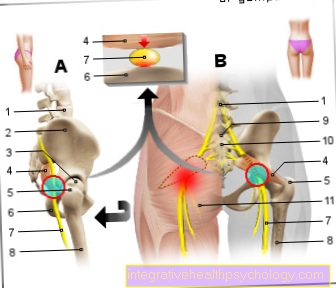Cough - symptom complex
Synonyms in a broader sense
Tussis, irritable cough, irritated throat
engl .: to cough
introduction
Cough can be a symptom of many different diseases, such as if you have a cold, bronchitis or allergic asthma.
This makes coughing one of the most common reasons for patients to see their GP. It is particularly important for the doctor to clarify whether the cough is present acute, so suddenly and only recently; or chronic (> 8 weeks) is.
A sudden cough without warning symptoms such as high fever, chest pain, shortness of breath or coughing up blood is usually a sign of a simple cold or a reaction to an irritation in the throat area, e.g. in allergic asthma.
If you have a cough that lasts longer than 8 weeks or if you have warning symptoms (so.) occur, additional diagnostic measures such as an X-ray or a lung function test must be carried out. This way, more serious diseases can be excluded. Especially in smokers, a dry, long-standing cough can hide lung cancer.

Discomfort when coughing
to cough sometimes occurs suddenly and quickly unfolds its full manifestation of the disease or begins more insidiously, possibly as a preliminary stage in the form of Sore throat noticeable. Whatever the cause, the cough is characterized by a pulling sensation in the chest and throat area. After coughing up, there is a brief improvement before the Throat irritation again increased.
In many cases, the cough does not begin until night and while lying down, or it worsens at this time of the day. The reason is that the ciliated epithelium of the upper airways slows down the work late in the hour and the foreign matter (mucus etc.) is no longer so quickly out of the lung promoted out. The now accumulating Mucus from the bronchi then triggers the urge to cough. The body wants to clear the airways as quickly as possible in order to ensure the exchange of oxygen. After long periods of coughing, there are sometimes cough-related pains that worsen the overall clinical picture.
The reason lies in a mechanical overuse of the respiratory muscles caused by the constant to cough is increasingly weakened. Many patients then try to suppress the urge to cough in order to avoid the painful expectoration. However, the attempt to suppress it usually leads to a further intensification of the cough stimulus. After very long periods of coughing or after very hard coughing up, it happens that a so-called Pneumothorax developed. This involves detaching one half of the lung from the Rib cage. The result is a buzzing of the lungs and, as a result, insufficient ventilation on this side.
A pneumothorax makes itself felt with shortness of breath and pain. If this results in a lateral displacement of the internal organs, one speaks of a tension pneumothorax, which must be treated in an emergency.
Cold and dry ambient air increases the urge to cough, while moist and warm air tends to weaken it.
Cough as a symptom of lung cancer
Lung cancer is one of the most common types of cancer in men and women. Most commonly, lung cancer occurs between the 55 and 60 years of age and mainly affects smokers or people who like work-related with cancer-causing substances asbestos or arsenic had to do.
Typical symptoms of lung cancer are weight loss, night sweats and fever (the so-called. B symptoms), chronic cough or frequent colds. Later on, shortness of breath and coughing up blood can also occur. However, the symptoms usually only appear when the tumor by its growth other structures like Bronchi compresses and pinches, whereupon the body reacts with a cough.
To this (often very late) At this point, the tumor may already be inoperable or metastatic. If lung cancer is suspected, in addition to a physical examination, a blood sample would be taken with the determination of special tumor markers. In the further course an X-ray would be done Computed Tomography, as well as a bronchoscopy with a tissue sample.
Because diagnosis is often very late, lung cancer has a very poor prognosis. In the early stages it can be cured with the help of surgery. However, lung cancer is diagnosed very late in more than two-thirds of patients. Most of these cases have already metastasized, which excludes surgical cure. The only therapy options that remain then are radiation or one chemotherapy. Although this can delay the survival of the patient by a few months or a few years, it can no longer cure the lung cancer.For this reason, it is important to clarify chronic coughs and recurring colds, especially in smokers. Lung cancer is often hidden behind the cough, especially in patients who are younger than 40 years of age.





























